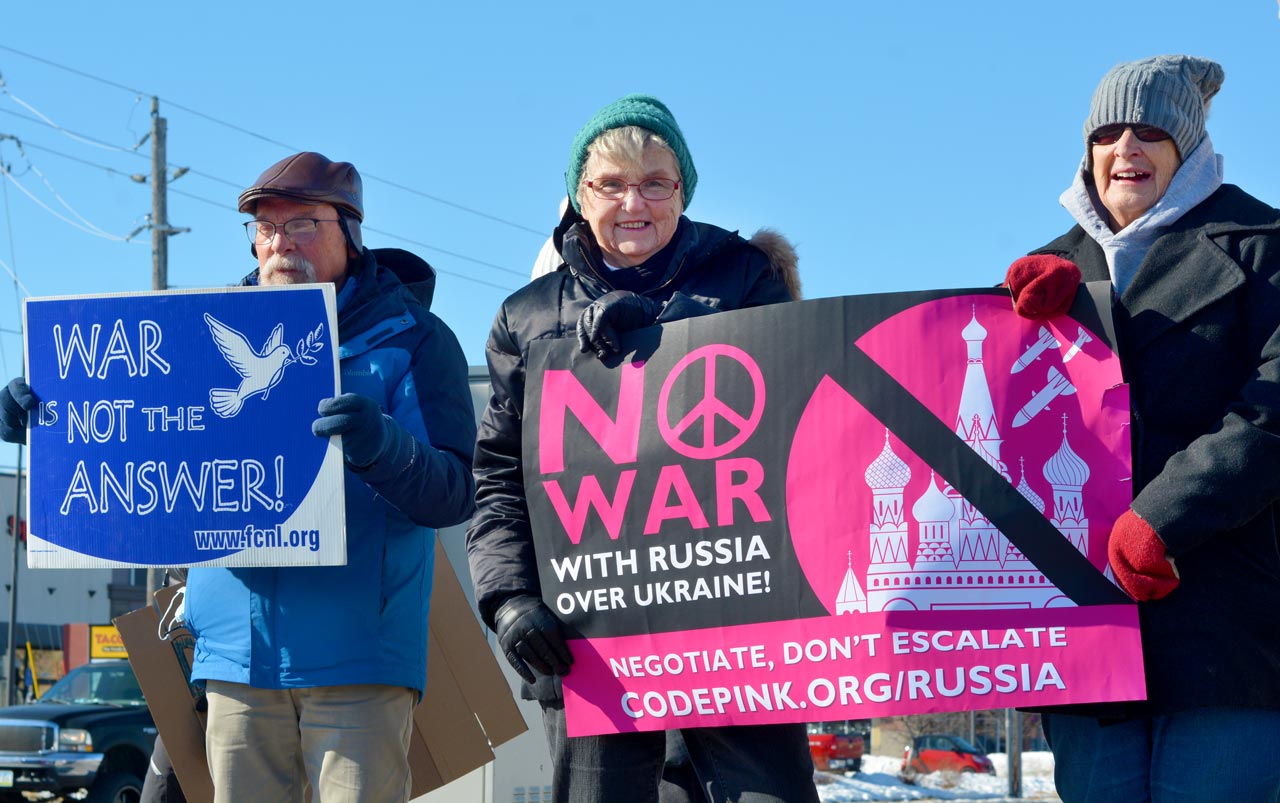
1. Russia has invaded Ukraine, and the international community has a stake.
After months of posturing and mobilizing troops and weapons at the Ukrainian border, Russian troops illegally invaded Ukraine on February 24. This Russian war of aggression is causing millions of refugees to exit Ukraine, hundreds of civilian deaths, and devastating damage to Ukrainian cities. The United States has sent thousands of troops to nearby nations like Poland and Romania and has provided weapons and other military gear to Ukraine. The U.S. and other countries have also responded with sanctions.
While political leaders continue to ramp up military action in the region, people around the world are calling for “No War in Ukraine,” as war in the region has already cost lives and prompted many people to leave their homes. Continued violent conflict will have devastating human and environmental costs.
With this invasion, the governing elite has shown yet again their willingness to go to war for imperialist goals, leaving a path of devastation for everyday people around the world in their wake. People in Russia, Ukraine, the U.S, and around the world need to join together and tell our political leaders: War is not the answer.
2. The current military buildup is the result of complicated political and historical dynamics between Russia, Ukraine, and the United States and NATO allies.
The Russian government feels threatened by the NATO military alliance’s expansion to, and significant military presence in, eastern Europe. This leads Russia to be hyper-aware of its influence in Ukraine and other nations it views as within its “sphere of influence.” In 2014, after a Russian-backed Ukrainian president was removed, Russia invaded eastern Ukraine, annexing the Crimea region and supporting a separatist movement in neighboring regions, a conflict that has costs thousands of lives.
Ukraine, in addition to the immediate threat to its people posed by the invasion, has concerns about its national sovereignty and undue Russian influence on internal affairs. Many Ukrainians want strengthened political and economic connections with Western nations, and potentially membership in the NATO military alliance.
The United States and NATO partners want to maintain military dominance, support Ukrainian sovereignty, and to protect Western interests in the region, including Russian-supplied gas. These countries have refused to limit potential NATO expansion, or to decrease their military presence in eastern Europe.
3. Congress and weapons companies are already trying to cash in.
War is profitable for weapons companies and beneficial for members of Congress, and these actors have already cashed in on war between Russia and Ukraine.
Weapons companies have been advertising their weapons for use in Ukraine and celebrating the impact violent conflict will have on their bottom line. Members of Congress are suggesting that the weapons produced in their congressional district are what is needed in Ukraine.
This pressure to spend more taxpayer dollars on weapons and war has already resulted in $800 million in military support from the United States.
We know that investments in weapons and war won’t make us safer. Instead, we need investments in diplomacy, peacebuilding, and arms control at the global level. And at the community level, we need investments in things like housing, food, healthcare, and education.
4. The conflict highlights the need for us to reorient our thinking about “security.”
We know that a peaceful and just future is possible, if we reorient our thinking about who deserves safety, and solve problems with attention to the wellbeing and security of all people, rather than just along national lines.
Safety is not having more and better weapons, amassing troops on borders, or threatening economic sanctions—it's building a culture of global collaboration, and ensuring that everyone has their needs met.
This can’t be done if we’re divided against each other and view our own safety as mutually exclusive from the safety of people in other countries. Instead, our leaders need to work collaboratively to solve global problems, caring not just about our own countries, but all of humanity.
The conflict between Russia, Ukraine, and the U.S could be transformed if our political leaders took seriously the legitimate concerns of other nations and worked collaboratively to solve them.
5. We need to come together across divisions to urge political leaders to prioritize people over national interests.
When we’ve come together across race, class, and national lines in the past, we’ve won things like higher wages and civil rights. Now, we need to come together against the devastating militarism and zero-sum-game thinking that permeates international relations today.
Let’s join together and urge our leaders to deliver better health care, schools, and jobs—not more money for weapons and war. Let’s urge them to solve problems together, seeking not to “win” but to ensure people everywhere have the resources and safety they need to thrive.
